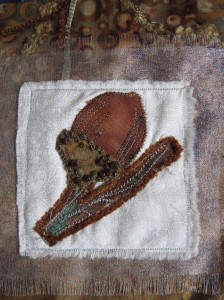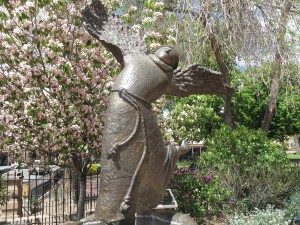Today is the Feast of St Francis, that delightfully eccentric saint whose scandalous conversion is the stuff of legend. From a distance, it is easy to love and admire him…although he drove many of those who knew him in person to total distraction. This is true of a lot of loose cannons; in fact, it is true of most of us. Our family may want to tear out its collective hair when we show up on the doorstep, while strangers and acquaintances find us charmingly off-beat. [Which is as good a reason as any to cultivate relationships with more strangers.]
The service associated most closely with Francis (in the minds of non-Franciscans, at least) is the Blessing of the Animals in honor of his gentleness with birds and wild animals. There are any number of stories relating how the animals of the forest would gather around him when he prayed, and birds would settle on his outstretched arms. This has allowed him to segue neatly into being the patron saint of the environment.
So today seems as good as any to consider a startling piece of information that I recently learned. About almonds. Apparently, almond trees require intensive irrigation to produce nuts. In fact, it takes 1.1 gallons of water to produce one nut. When I read that, I sat there for a good half-hour with my jar of raw almonds beside me trying to figure out how much water an almond tree actually consumes in its lifetime. It was mind boggling. And given that California (which is in deep drought) is the world’s major producer of almonds (on the order of 80% of the earth’s entire commercial crop), I can only imagine the conversations around the dinner tables of water board members, almond growers, local politicians, and conservationists.
The conversation at our dinner table was short and sad. No more almonds. I love almond butter (along with just about every other nut butter going, but almond is my current favorite). But I don’t love it as much as I love the earth and the water table that undergirds our whole existence. I don’t love almonds enough to subject my grandchildren or great-grandchildren to a world of forced water-rationing. I cannot justify buying almonds when I know that we cannot sustain growing them (at least commercially which is how I have them at all)…and when I know that I don’t begin to pay per pound what they cost in resources. But, in the spirit of discovering which nuts could replace almonds, I started doing some investigating.
 Turns out walnuts take 4.5 gallons per nut. (Why the article chose almonds to serve as the bad example, I am no longer sure.) I can’t find the information for pecans – although pecan trees (which can grow to 30 feet tall) – average 850 gallons a day of water. So my jar of almonds suddenly looked a lot better for the earth than my jar of walnuts. Meanwhile, my jar of pecans is getting a ‘by’ at the moment while I wrestle with eating nuts in general. This is not an easy or clear wrestling.
Turns out walnuts take 4.5 gallons per nut. (Why the article chose almonds to serve as the bad example, I am no longer sure.) I can’t find the information for pecans – although pecan trees (which can grow to 30 feet tall) – average 850 gallons a day of water. So my jar of almonds suddenly looked a lot better for the earth than my jar of walnuts. Meanwhile, my jar of pecans is getting a ‘by’ at the moment while I wrestle with eating nuts in general. This is not an easy or clear wrestling.
About a decade ago I made a decision that I need to know what I know. So, on this Feast of St Francis, while I am paying attention to my relationship with the environment, I realize that nuts are just the latest in a long line of messages that invite me to pay attention. I make compromises as we all do…but I need to acknowledge that they all come with a cost. Our wise elders and prophetic voices speak truth to us; it is essential that as many of us as have the courage and the intelligence and the compassion to hear them, act on what they tell us. Does it matter that my neighbor doesn’t follow that wisdom? Yes. Yes, it does. It matters that she drives a honking huge SUV and he drives a pick-up, and they never recycle one scrap of anything. But I can only model as responsible a lifestyle as I can muster and offer the truth to my neighbor in conversations from time to time. I cannot control them.
With myself, I can (and do) expect action based on what I know.
Over time I have become aware that the glorious abundance of out-of-season food in my grocery store is putting a huge stress on the earth and leaving a massive carbon footprint. So, I am trying to eat more local and in-season food. Barbara Kingsolver’s marvelous book, Animal, Vegetable, Miracle is a true inspiration in this commitment. Let me hasten to say that I am not even close to Kingsolver and her family in this regard, but I can’t “unknow” that many of my choices are not only bad for the planet (which would make them bad for me eventually), they are bad for me right now.
Knowing what I know means I can’t just glide through life shrugging and saying, “This is too hard to figure out, so let’s pretend it doesn’t matter.” It matters. Knowing what stress raising cattle and pigs puts on the planet, I have cut way back on the red meat and bacon I consume. I haven’t eliminated it, but instead of 3 or 4 meat-based meals a week, it is down to one or two meals with meat as the side dish. (Maybe once a month meat is the main course.) We recycle our bath water to the plants. We drive one car: a hybrid. We recycle everything we can; and compost everything we can; and pass along everything we can.
And what heartens me is that so many of you who love the planet as much as I do are making choices and changes that make sense to you – maybe it is not around nuts or meat or recycled bath water; likely it is something I haven’t become aware of yet. Or you decide to recover the old couch rather than buy a new one. Or you are able to put solar panels on your house – something our HOA doesn’t allow. Or you don’t own a car at all. Or you live in a 400 sq ft house rather than the 1300 sq ft house we own.
Thank you for knowing what you know. (And if any of you happen to know how much water a pecan takes to grow, please pass it along to me.)
Meanwhile: happy St Francis Day.
–Andrea
Text © 2014, Andrea La Sonde Anastos
Photos © 2014, 2009, Immram Chara, LLC
NOTE: The photo of the St Francis is available as a card or print from my Etsy Shop this season. The acorn is a close-up from one of my fiber art pieces (Shift) in the Archives.

Pecans, in our very wet part of the world, aren’t irrigated. At least as far as I know.
Well that is encouraging. I know that all the water that goes onto a tree doesn’t end up in the nuts (or fruit). I know that the trees also clean the air — so it is a puzzlement to try to work it all out.
What I hope for is to keep paying attention and to keep listening with care to those who help me pay attention.